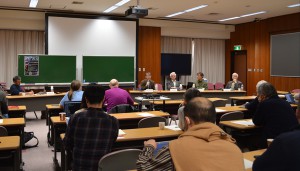ELSI Blog
48 Life: Definitions and Complexity

The subject "Why life?" is an attempt to move beyond the philosophical and
investigational roadblocks of the usual question, "What is life?" Without an independent
example, in attempting to answer the first question we risk being both too narrow and too
broad. Surely the definition of life cannot be reached by reductionism in comparing
known living organisms. One could easily "over-fit" such a definition, not allowing any
other cases than what has already been described. As an absurd example, one could
claim that a key definition of life is the use of left-handed amino acids in polypeptide
synthesis, as, so far, it is a universal descriptor. Therefore, we should casually dismiss
any discoveries of apparent "living systems" using right-handed amino acids. They may
be interesting in their own right, but, clearly, they cannot be life! Fortunately, most
biologists and chemists are allergic to this kind of narrow-mindedness. However, in
reaction against it, we can overcompensate with definitions so broad that they clearly
overlap with even simple non-living systems. This can produce philosophical forays into
the life-like nature of crystals, stars, and hurricanes, to name a few examples. Are these
physical systems truly puzzling "border-cases" in searching for new forms of life, solely
by merit of their thermodynamic properties? I do not think it controversial to propose
that they are not.
One difficulty with trying to pin down the universal principles behind a definition of Life
is a contradiction at the core of the question: it at once divides the observable universe
into a dichotomy of "life" and "non-life", while only requiring a positive definition of the
former, implying that it is really, after all, a nested category within "non-life". Should we
be just as eager to pursue a definition of non-life? Would a workable definition of nonlife
therefore, by exclusion, define "life"? Or, could other systems exist, excluded from
non-life, yet not clearly defined within "life"? If life is a special case in the organization
of matter, could there be other special cases, just as distinct, but entirely orthogonal to
any definition we could provide to life here on Earth? Would even two independent cases
be enough? Or, if we are so fortunate as to discover life across the universe, would each
discovery further expand and refine our definition, so that it was never complete, and
never satisfactory?
In contrast, "Why life?" appears more tractable, and perhaps a better place to start. What
are the innate processes and organizations of matter that permit something like observed
life on Earth to emerge and persist? Why should this work at all? The fact that life exists
is truly incredible. This incredibility is not necessarily because it is unlikely; unlikeliness
alone can be dealt with by selection bias and the weak anthropic principle. It is more
than that. At first look, it is the incredibility that the odds are nonzero.
Our intuition links this incredibility to the necessary complexity of life. But, is this fair?
We do not seem to reserve this same awe for the complexity of geochemical and
hydrological systems, and the dynamic and creative processes that result from their
interactions. We do not even blink at the assumption that these processes are universal,
and may be even more complex on other worlds; the geochemical diversity within our
solar system alone is stunning. Many planetary systems have powerful engines of
disequilibrium, rich organic and inorganic chemistry, and a diversity of rapidly changing
physical conditions. The combinatorial fecundity resulting from these processes over
geological timescales is enormous. If the emergence of life is templated on and nurtured
by this deep underlying fecundity, perhaps life is not unique in its complexity, and, one
specific complex chemical regime is not unique to life (although it may be for the origin
of life on any given planet). Rather, this initial complexity comes "for free", and in some
cases, is captured, distilled, abstracted and dispersed by the power of natural selection.











